|
A Real Simple Guide to
|
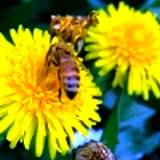 | 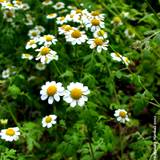 | 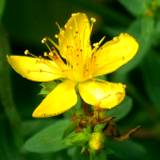 |
Starting an herb garden this year will give you a lifetime of healthy seasonings, medicinal teas, organic herbs for fresh salads and unlimited ornamental decorations.
Herbs can feed your soul and your senses. Herb gardening really isn't as difficult as you might think, the trick is planning, maintenance and keeping an eye on the herbs that have a habit of taking over the garden. Many herbs will spread and reseed itself so if you take the time to seperate the new plants you'll have a wonderful, abundant herb garden. There is an old-wives tale about herbs, if you give your new seedlings away to neighbors and friends you will always have an abundance of herbs.
The first thing to think about is what kind of herbal garden would suit your needs.
- Medicinal Herbs
- Fragrant Edible Flowers and Herbs
- Culinary Herbs, like Chives, for Spices and salads
- Flavorful Incredible Chamomile Tea
- Calming herbs like Lavender.
- Ornamental Herbs for drying
- Mixture of all of the above
The second thing to think about is where will your herb garden be located?
- Do you have a large plot with plenty of sunshine?
- Or do you have a tiny area that is mostly shade?
- Do you prefer keeping your herbs potted?
Knowing the answer to these questions before you begin will determine if your experience with herb gardening will be a rewarding journey or a garden nightmare.
Many herbs can be started from seed indoors in late winter than transplanted in early spring. If you don't have the space in your home to start plants, you can visit your local nurseries and buy herb plants, just make sure you are dealing with an organic nursery. Avoid buying your herb plants at a supermarket or garden shop in you local shopping area. Most likely these plants were shipped in by the truckload and treated with chemicals to preserve them for shipping.
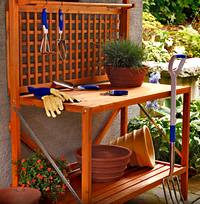 Like any hobby you start it's always best to have a workstation to keep your tools and supplies that will be in your reach. Of course you don't need anything expensive or elaborate to get your herb garden started. A simple picnic table in your back yard can work as well as anything else. The picnic benches can be used to hold your supplies and tools and tucked under the table to protect from the weather.
Like any hobby you start it's always best to have a workstation to keep your tools and supplies that will be in your reach. Of course you don't need anything expensive or elaborate to get your herb garden started. A simple picnic table in your back yard can work as well as anything else. The picnic benches can be used to hold your supplies and tools and tucked under the table to protect from the weather.
Never use the soil from your garden or the soil from last years potted plants. This soil could be full of weeds, bacteria, and mold. Always start your plants with clean fresh soil bought from you local nursery. Make sure you check that the soil is organic and has no chemical additives. Don't be tricked into buying soil that promises a huge production and giant plants, most likely this soil has chemicals added. The best additive you can use is your own organic compost.
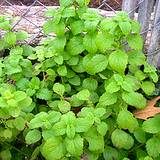 | 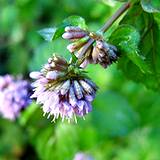 | 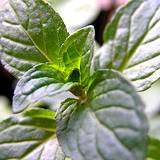 |
Exploring Mint Herbs
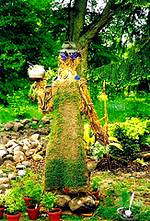 There are as many varieties of mint as there are advantages to planting it. If this is your first herb garden give at least a couple of mint flavors a try, you will never regret planting mint.
There are as many varieties of mint as there are advantages to planting it. If this is your first herb garden give at least a couple of mint flavors a try, you will never regret planting mint.
One of the best places to plant mint is around the border of your house. The fresh aroma of mint will flow into your windows on a windy day, giving your home a fresh clean smell. This will also allow mint to be handy anytime you want to flavor your hot or iced tea. Mint is also the most commonly used medicinal plant. Peppermint tea is great for digestion and quickly helps ease an upset stomach.
Another good reason to plant mint around the border of your house is it's a natural insect and rodent repellent. Mice hate the smell of mint and pennyroyal will repel and even kill fleas, all this without the worry of poisoning your family or pets. Soaking a bandana in Pennyroyal tea will make a naturally safe flea collar for you dog, even after it has dried.
I'm sure you have heard of most of the common mints, like Peppermint, Spearmint, Pennyroyal, and Catnip.
But you may not be aware of how exotic mints have become, like:
- Chocolate Mint
- Pineapple Mint
- Apple Mint
- Orange Mint
Mint is a wonderful herb to experiment with. They are so easy to plant and require very low maintenance. They will multiply and spread through your herb garden year after year while you continuously prune them to use for multiple purposes. Children love pulling off a leaf or sprig and chewing on it, just don't let them know the mint is good for them!
Real Simple Wisdom Tips For Planting Your Herb Garden
 You will quickly find that starting an herb garden is one of easiest and most rewarding projects on your to-do list this spring. It doesn't matter if you live on acres of land or live in an efficiency apartment, herb gardening is within your reach. All you need is good potting soil, herbs of your choice, water and sunshine.
You will quickly find that starting an herb garden is one of easiest and most rewarding projects on your to-do list this spring. It doesn't matter if you live on acres of land or live in an efficiency apartment, herb gardening is within your reach. All you need is good potting soil, herbs of your choice, water and sunshine.
We can all use a few simple gardening tips:
- Always start with new potting soil.
- If you're starting your plants from seed use those little peat moss cups so when you transplant you won't need to disturb the roots. These cups will dissolve right into the soil.
- If your into recycling you can use cardboard egg cartons to start your plants by simply removing the lid. It's the perfect size to sit on your windowsill.
- Use garden gloves when handling potting soil and plants. If you don't have garden gloves at least put a coating of Vaseline on your hands. Cleaning you hands and fingernails will be so much easier.
- Herb gardening is so much easier when you have the right garden tools, but if you don't using a heavy weight tablespoon and butter knife will get the job done.
- When transplanting your herbs into the garden or bigger container make sure you cover the plant a couple of inches up the stem for a stockier plant.
- Keep in mind which plants are tall and which are low to the ground to avoid blocking the sun from the low plants.
- When planting several different kinds of plants in one container or herb garden it is always best to put a separator in between to avoid spreading and allowing one plant to dominate another.
- Put a generous amount of mulch around your plants to help control weeds and hold the moisture.
- Schedule to weed your garden at least once a week.
- Water new plants everyday, once your herbs are established a couple of times a week will do.
- If you're using containers make sure you have proper drainage hole in the bottom and check every couple of weeks to make sure they aren't clogged.
The most important tip of all is to enjoy your new project. Don't make it so big that is becomes a chore you will dread doing on a regular basis. Keep it simple and exactly what you want. Love your herb garden and you will have a bountiful harvest of fresh herbs year after year.
DISCLAIMER:
The statements made here have not been approved by the Food and Drug Administration. These statements are not intended to diagnose, treat or cure or prevent any disease. This notice is required by the Federal Food, Drug and Cosmetic Act.
Return from Herb Garden to Herbal Wisdom
Return to Grandma's Wisdom Home





